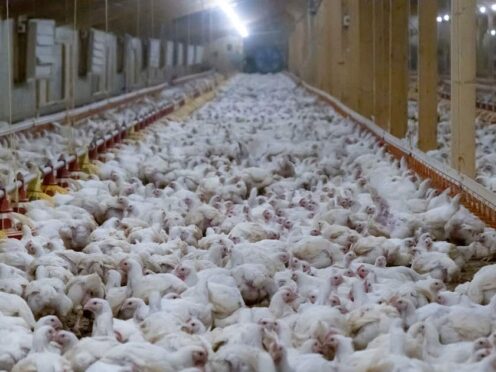
The Co-op’s new chairwoman is facing pressure from members to remove “Frankenchickens” from the supermarket group’s supply chain.
Broadcaster and naturalist Chris Packham is leading calls from more than 2,000 Co-op members for Debbie White to respect the membership’s wishes to stop selling meat from low-welfare, fast-growing breeds of chicken.
In an open letter organised by animal protection charity The Humane League UK, the members urged Ms White to be “an advocate for giving Co-op chickens a better life”.
It said: “This breed of chicken is genetically selected to grow unnaturally big and unnaturally fast in order to maximise profit margins. But the true cost of this breed is the suffering.
“Frankenchickens are likely to collapse under their own weight and to experience organ failure and heart attacks, alongside a myriad of other health problems.”
The Co-operative Group, which is jointly owned by around five million individual members and societies, came under fire last year after an investigation showed footage of what appeared to be malformed chickens at supplier farms.
During the company’s annual general meeting in May, 96% of the 30,000 members who voted supported a resolution asking the board to consider adopting in full the Better Chicken Commitment (BCC) – a set of standards adopted by Marks & Spencer, Waitrose and Greggs.
These include banning cages, giving birds more space, ditching “Frankenchicken” breeds and introducing less painful slaughter conditions.
In response to the motion, the Co-op’s directors said its free-range chicken already met the BCC standards while its core chicken ranges met some of the standards.
But the board also said profits were likely to fall in the year ahead so they would “continue to consider how we can enhance chicken welfare … whilst recognising the need to offer good value to customers”.
The supermarket recently announced it will give all animals raised for their fresh chicken 20% more space under a new “space to thrive” initiative and said it has adopted all the BCC standards apart from changing to a slower-growing breed.
In the letter, signatories welcomed the changes but said they were “disappointed” by the board’s decision to continue to stock the fast-growing breed of chickens.
They wrote: “We want our Co-op to agree to shift away from the cruel practice of raising Frankenchickens for meat and be the pioneer in animal welfare that is written so proudly in our sustainability reports.
“We are not expecting changes overnight, but we want to hear a commitment from the board that our Co-op will be leading the way for a better future for farmed animals.”
In a video released to coincide with the letter, Mr Packham addressed Ms White, saying: “Wouldn’t it be good not to use that breed of chicken any longer? To send a clear message via the consumers, through your stores to the producers that we’re no longer happy with that taking place.
“The Co-op prides itself on being an ethical supermarket, an ethical organisation, and times have changed Debbie, we know this. We’ve got to change our minds and our practices,” he added.
“So can I ask you to please consider not taking any more Frankenchickens in the Co-op stores? It would send out a fantastic message, like I said. It would be a great step forward – something to think about in your first few weeks and months as Co-op chair.”
Claire Williams, campaigns manager at the organisation, said: “Co-op claims to stand apart from other supermarkets because of its ethics.
“Yet they profit from factory farming tens of millions of innocent chickens every year, locked in dirty barns, bred to grow so agonisingly quickly that many struggle to walk.
“Debbie has an amazing opportunity to push for change, and we want to help her do the right thing and stop using Frankenchickens.”
A Co-op spokesperson said: “Ensuring the animals in our supply chain are looked after is a priority and all of our fresh chicken is 100% British, meets or exceeds Red Tractor standards and birds are reared to lower stocking density (30kg/m2), which is a higher welfare standard and has a significant positive impact on welfare and health of birds.
“We are a member-owned organisation, constituted to create value for our members and we have fully complied with the 2023 AGM request of our members to consider improvements in our chicken welfare.”

Enjoy the convenience of having The Sunday Post delivered as a digital ePaper straight to your smartphone, tablet or computer.
Subscribe for only £5.49 a month and enjoy all the benefits of the printed paper as a digital replica.
Subscribe